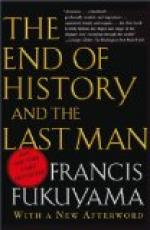|
This section contains 3,818 words (approx. 13 pages at 300 words per page) |

|
SOURCE: “What Francis Fukuyama Can Teach … and Learn,” in Dissent, Vol. 43, No. 1, Winter, 1996, pp. 109-14.
In the following review, Heilbroner provides an overview and critique of Fukuyama's historical, political, and social perspective in The End of History and the Last Man and Trust.
Francis Fukuyama's The End of History predictably earned him a skeptical response when it appeared a few years ago, especially from critics on the left, many of whom, one suspects, had not read the book. (There are some notable exceptions, such as Perry Anderson's “The Ends of History,” a brilliant treatment, at once critical and admiring, in A Zone of Engagement.) Our daily exposure to Yugoslavian chaos, Russian anarchy, Chinese instability, African decay, and not least, United States retrogression offered ample reason to jeer at what seemed to be the smug conservatism of his title. Having myself harbored similar sentiments at the time (and for...
|
This section contains 3,818 words (approx. 13 pages at 300 words per page) |

|


